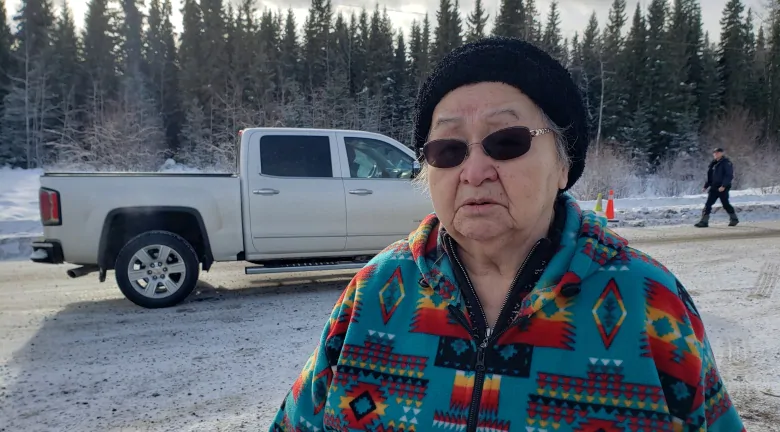Wet'suwet'en prepare for clan meetings to discuss rights and title proposal

Members of the Wet’suwet’en nation are anxiously waiting to find out what’s in the draft agreement that their hereditary chiefs recently struck with provincial and federal officials — and will learn more at clan meetings within the week.
The First Nation will review and potentially ratify the agreement, drafted over the weekend after weeks of civil unrest erupted across the country over the proposed Coastal GasLink pipeline and RCMP arrests of Wet’suwet’en people and their supporters who oppose the project on nation’s territory in northwestern B.C.
“This is where our nation has been trying to get ever since the Delgamuukw Gisday’wa court case was settled,” said Wet’suwet’en hereditary chief Kaliset (also known as Violet Gellenbeck), referring to the Supreme Court of Canada’s decision in 1997, which confirmed that the Wet’suwet’en and Gitxsan nations never surrendered title to their traditional territories.
However, the case never fully resolved the question of title.
The five Wet’suwe’ten clans will meet this week. Kaliset said she’ll go to her meeting Tuesday night to find out how the draft agreement might resolve that question.
“I’m hopeful that the report that we’re going to receive tonight will be what we’re looking for as a nation,” she said.
Molly Wickham, a member of the Gidimt’en clan within the Wet’suwet’en nation, said it’s important for Wet’suwet’en people to know that everybody is welcome at the meetings, including elected band leadership who, unlike the hereditary chiefs, have largely supported the pipeline.
The band leaders “should be attending,” she said. “They’re first and foremost a part of the clan.”
Former elected chief Karen Ogen-Toews is optimistic the hereditary and elected leaders can work side by side, though she acknowledges that the latter is a colonial construct, imposed on First Nations by the Indian Act.
The hereditary chiefs, whose leadership predates the act, assert authority over 22,000 square kilometres of the nation’s traditional territory.
“The fact of the matter is the elected council and the Wet’suwet’en hereditaries are Wet’suwet’en,” said Ogen-Toews, who is the CEO of the First Nations LNG Alliance and among the most outspoken supporters of the pipeline.
She said if the Wet’suwet’en are looking to change their system of governance then the elected leadership needs to have a say.
This sentiment was echoed by the current elected chief of the Wet’suwet’en First Nation, Maureen Luggi.
But Luggi is also hopeful about discussions ahead and said she’ll support the hereditary chiefs in their next steps “as long as there’s openness.”
The draft agreement does not address the pipeline at the heart of the conflict and, Wickam notes, its approach to rights and title will be “one piece of the bigger issue.”
“The whole reason this discussion began is not resolved. We continue to push for the RCMP to get out of Wet’suwet’en territory. We continue to push to have them stop construction while we’re in these discussions,” she said.
Kaliset said her family has already been in discussions about what happens next and said she’ll be reconnecting with her family again after Tuesday night’s clan meeting.
She said it’s too early to know if her family will support the draft agreement.
“We have to be fully aware of what’s being negotiated at this point … So the first thing is we have to all be educated,” she said.



